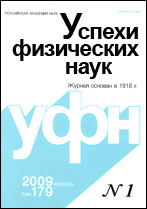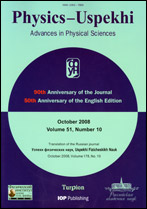|
This article is cited in 3 scientific papers (total in 4 papers)
PHYSICS OF OUR DAYS
Quantum entanglement, teleportation, and randomness: Nobel Prize in Physics 2022
A. K. Fedorovabc, E. O. Kiktenkobc, K. Yu. Khabarovaab, N. N. Kolachevskyab
a Lebedev Physical Institute, Russian Academy of Sciences, Moscow
b Russian Quantum Center, Skolkovo, Moscow
c National University of Science and Technology MISIS, Moscow
Abstract:
Precise control for individual quantum systems, such as individual photons, atoms, or ions, opens the door to a range of quantum technologies. The goal of this concept is to create devices that, due to quantum effects, will be able to solve prob„lems of data processing and secure information transfer and high-precision measurements of parameters of the surrounding world more effectively than existing approaches do. The key step in the advent of quantum technologies was the pioneering work of the second half of the twentieth century, which, first, showed the paradoxical nature and correctness of the quantum mechanical description of nature and, second, laid down and introduced the basic experimental approaches that became the basis of modern quantum technologies. The Nobel Prize in Physics 2022 was awarded to Alain Aspect, John Clauser, and Anton Zeilinger for their experiments with entangled photons, establishing the violation of Bell inequalities, and pioneering quantum information science.
Received: March 27, 2023
Revised: June 5, 2023
Accepted: June 16, 2023
Citation:
A. K. Fedorov, E. O. Kiktenko, K. Yu. Khabarova, N. N. Kolachevsky, “Quantum entanglement, teleportation, and randomness: Nobel Prize in Physics 2022”, UFN, 193:11 (2023), 1162–1172; Phys. Usp., 66:11 (2023), 1095–1104
Linking options:
https://www.mathnet.ru/eng/ufn15667 https://www.mathnet.ru/eng/ufn/v193/i11/p1162
|


| Statistics & downloads: |
| Abstract page: | 226 | | Full-text PDF : | 14 | | References: | 26 | | First page: | 17 |
|





 Contact us:
Contact us: Terms of Use
Terms of Use
 Registration to the website
Registration to the website Logotypes
Logotypes








 Citation in format
Citation in format 
